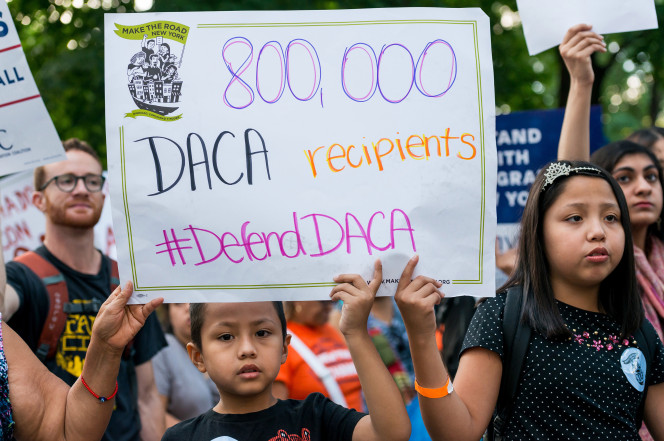Don’t End DACA: The Immigration Program Trump Must Save
 President Trump will — possibly before the weekend - decide whether to keep or cancel Deferred Action for Childhood Arrivals, which allows more than 800,000 unlawful immigrants who were brought here as children to live and work legally. The Obama-era executive action that created DACA spurred many lawsuits, and even Trump originally waffled between saying that “they have to go” and “we are gonna deal with DACA with heart.”
President Trump will — possibly before the weekend - decide whether to keep or cancel Deferred Action for Childhood Arrivals, which allows more than 800,000 unlawful immigrants who were brought here as children to live and work legally. The Obama-era executive action that created DACA spurred many lawsuits, and even Trump originally waffled between saying that “they have to go” and “we are gonna deal with DACA with heart.”
Although the president still seems to be waffling on the issue, most Americans have made up their minds. Almost 80 percent of registered voters, and a whopping 72 percent of Republicans, said the DACA recipients should be able to stay or earn citizenship, according to a recent Morning Consult poll.
They’ve earned those high poll numbers. These young unlawful immigrants are Americans in the non-legal sense of the word. It would be a mistake to undo the policy that allows them to stay and work legally.
DACA is a two-year work permit limited to unlawful immigrant children brought here younger than age 16 who are attending school or have graduated, who have continuously resided here since 2007, who aren’t criminals and who fulfill a handful of other requirements.
DACA recipients can’t vote and it’s not a path to citizenship, just a work visa and deportation reprieve. Yet they speak English, grew up steeped in American culture and have roots here as deep as many native-born Americans. A recent Cato Institute paper found that they are less likely to be incarcerated than native-born Americans with the same age and education level.
Nearly 91 percent of them are legally working, up since President Barack Obama enacted DACA. When Joel Cruz of California first heard of DACA, he wrote, “I’ll be able to get a better job — maybe with some benefits and maybe one that doesn’t require hard manual labor.”
Tens of thousands like Cruz entered the workforce because of the program. Their roughly $30 billion a year in earnings has a job-creating ripple effect on the economy.
DACA recipients also pay their own way. They can’t collect welfare benefits but they have to pay taxes. My colleague Ike Brannon estimates recipients will pay about $60 billion more in federal taxes than they’ll consume in benefits over the next decade.
All of that will change if Trump ends DACA. Those who lose their work permits will be forced to work illegally or leave the workforce altogether. Businesses will have to spend an estimated $6.3 billion in turnover costs when the government forces them to fire these employees. This will shrink the size of the economy, eliminating jobs.
According to the OECD, immigrants in the United States are more likely to work than native-born Americans — the opposite of Europe, where immigrants are less likely to work. Repealing DACA will not turn the United States into Europe, but it’ll push us in that direction.
Ending the program would harm trust more than it would harm the American economy. Recipient Jung Woo Kim recently said, “If DACA is repealed, they have my most updated tax return and know where I live.” Kim and others took the opportunity even though there was a risk of identifying themselves as unlawful to a government that set deportation records under Obama and is gearing up to exceed them under Trump.
Young, DACA-eligible unlawful immigrants who were brought here as children and grew up here trusted the government with their personal information in exchange for the reprieve from deportation and a work permit. They think of themselves as Americans and want to believe the protection they were given won’t suddenly be yanked away.
The DACA recipients are culturally and educationally American. They pay their own way, contribute to the economy and don’t live off government handouts. Legislative solutions like Rep. Carlos Curbelo’s (R-Fla.) Recognizing America’s Children Act would place them on a path toward citizenship and fix this problem once and for all.
A majority of Americans are eager for just such a solution.








